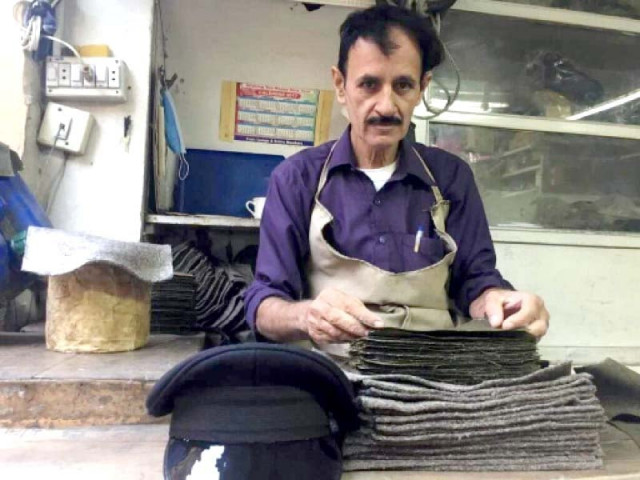Cap maker of the cantonment city
Involved in the profession for 60 years, it has now started taking a toll on wizening Ishaq’s health

Ranging from peaked caps, service caps, forage caps, barracks covers and combination caps, headgear has long been a symbol of rank and identity for military, law enforcement and government officials around the world.
However, different from average caps, these headwear require skilled craftsmanship, great precision and often the most expensive of raw materials to produce. Yet, considering the national significance of the heads they are likely to rest on, these caps go through strict quality control and several security checks before they’re ready to be crowned.
Prior to the creation of Pakistan, the production of these special caps, for British officials, was largely centred in the cities including Rawalpindi, Abottabad and Peshawar. Today, with the country’s capital only a few kilometers away in Islamabad and military head offices in Rawalpindi, much of the military headgear comes from the garrison city.
“These caps are not mass manufactured, so they need to be crafted individually, by hand. Which is often a long and grueling process,” told Mohammad Ishaq, a veteran artisan operating at one of oldest service cap shops in the city’s Lord Macy’s Gate area.
Ishaq, who hails from the city of Sialkot, has been associated with the cap-making profession for the better part of the past six decades. “I moved to Rawalpindi sometime in the early 1960s and stumbled upon this shop in the cantonment area. Here, I found a teacher from my hometown, who trained me in the art of service cap-making, and I have since called this place home,” said the old-hand artisan. “In the last sixty years, I have made caps which have graced the heads of several top-grade military, air force, navy and government officials,” he added.
However, where Ishaq’s patriotic spirit allows him to take great pride in his work, the long grueling hours and deleterious working conditions of his job have now started taking a toll on the wizening man’s health. “It takes some six to eight hours to make a single cap,” said the artisan who spends over 16 hours a day, with his back arched and eyes peeled to his crafting table. Years of working bare hand, often dabbing toxic glues and solutions, have rendered Ishaq’s nails and fingertips as sanding paper.
“Gloves hinder work, so we prefer not wearing them. But as a consequence, fingers hurt every day when I go back home. These are the conditions I must bear with to put food on my table. So when it hurts too much, I put some balm and mustard oil. That usually helps relieve the pain,” the cap-maker told.
According to Mohammad Ishaq, a single high-quality service cap made using materials like silk, felt, quilted cloth and gold-coated buttons and insignias, can retail for anywhere between four to twenty thousand rupees.
Published in The Express Tribune, January 20th, 2021.



















COMMENTS
Comments are moderated and generally will be posted if they are on-topic and not abusive.
For more information, please see our Comments FAQ